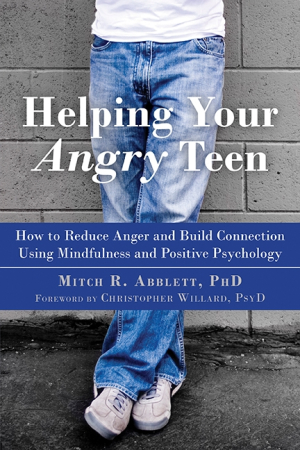Helping Your Angry Teen
How to Reduce Anger and Build Connection Using Mindfulness and Positive Psychology
Dealing with an angry child is complex and often even scary. In Helping Your Angry Teen, Mitch R. Abblett, PhD, teaches parents to form new pathways of connectivity to their teens through mindfulness and positive thinking and acting. It offers specific techniques and brilliant insight into learning to help young people caught in often destructive cycles of anger.
Rather than trying to solve whatever problems are causing a teenager to be angry, the book focuses on what a parent can do to improve communication and respond to anger with presence, understanding, responsive leadership, and empowerment. The author calls this the PURE method of communication, and it is the central idea of this book. Once a parent develops the ability to stay mindful of their thoughts and actions when their teenager is angry, they will learn to see beyond that anger to the authentic issues that are driving it. They can then own any part they may have contributed to their child’s issues and demonstrate appropriate, respectful responses. Finally, they can help their teenager make whatever changes are needed.
The techniques described in this book include a great deal of meditation, self-exploration, and learning to look at problems in a new light. Each step of the PURE process is carefully explained, and the exercises are effective and even enlightening. There is no blame handed out and no judgement of parent or child. The author clearly has a great deal of compassion for troubled teens: “The kids who swear, kick, punch, refuse, and fail, are ‘empathy hard.’ What’s crucial to understand, however, is these ‘unruly’ kids are no less deserving of empathy.”
Helping Your Angry Teen is a useful resource for parents wanting to learn to improve their communication with their teenagers. The techniques and practices suggested in this book will undoubtedly help improve anyone’s ability to communicate effectively in the face of anger and may also improve their overall well-being.
Reviewed by
Catherine Reed-Thureson
Disclosure: This article is not an endorsement, but a review. The publisher of this book provided free copies of the book to have their book reviewed by a professional reviewer. No fee was paid by the publisher for this review. Foreword Reviews only recommends books that we love. Foreword Magazine, Inc. is disclosing this in accordance with the Federal Trade Commission’s 16 CFR, Part 255.

